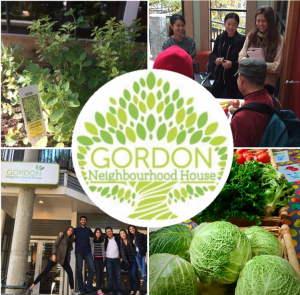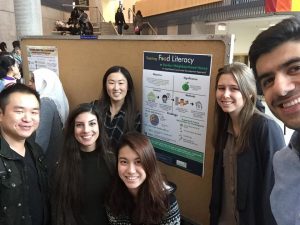Looking back on our journey over the last few months, we see our paths have been anything but on the straight trajectory you might expect. Through the up and downs, back tracks, and rerouting, we have not only accomplished our project goals, but more importantly have changed how we see important issues and how to be more effective change makers.

Look back at our moments
In our final group blog, we are going to sum up our learning experience throughout the community food hub project at Gordon Neighbourhood House. During this project, we had the opportunity to work as a team in educational workshops, and help the community to increase their knowledge about food preservation methods. As a team, we shared our skills and experience that we gained through this course with each other via our group blogs, infographic and final report. Sharing our knowledge and experience helped us make sure that we are all on the same page, and each contributing equally to our project. Working in the educational workshops at Gordon Neighbourhood House was an opportunity for us to understand the importance of food literacy in a community. We realized that food literacy is the key role to change people’s perspectives toward a sustainable food system, and can eventually lead to food security in the community. As we continue on in this blog post, we are going to discuss our findings throughout this course in more detail…
Moment of Significance
What?
As we approach the end of the course, we have reflected on and evaluated personal experiences gained through engaging in the Community-based Experiential Learning (CBEL) project. We highlight what we have learned in the foundations of this course – by sorting out the issues, significance, approaches, findings and implications of our project in the Infographic and the final report. Asset-based community development (ABCD) approaches help us highlight issues and needs of the community by recognizing community strengths and assets. Through asset mapping, it is important to foster connections and relationships in a community – in order to identify each other’s strengths and resources (Green & Haines, 2002). That enables us to elaborate on how they can build on what already exists in the community. Our project, as Community Food Hub Helper, can act as a vehicle for community building by exploring effective collaborative engagement. We conducted two food literacy workshops. In addition, each member further engaged with our community partner by volunteering at the produce market or the community kitchen. It is our hope that our food literacy workshops will increase community members’ ability to understand food so that they can develop a positive relationship with food and apply these skills and practices in a manner that not only helps them to improve their health or using food in a way that compliments their current economical situation but to also further their understanding of the complex food system as well (Cullen et al., 2015). Furthermore, these community services facilitate community engagements and we suggest that having hands on experience creates a positive learning environment for those members who participate in the community.
Our relationship with our community partner is also considered as an asset. Through the collaborative community-based project, we learned that identifying community strengths and assets could enable us to develop a course of action and facilitate community development through a food justice lens. These lens has given us a new perspective how the current food system can be transformed through community inclusion and elimination of disparities and inequities (Food Secure Canada, 2016). The community food hub has demonstrated to us Gordon Neighbourhood House’s social advocacy for food system changes especially when it comes to the changing the model of food banks in order to move down the food security continuum. This was also new information to us because most of us has only known of the traditional food bank model.
Analyzing our ‘Moments of Significant Change’ (posted on blog 3) was a critical moment for us because it it helped us realize that we had experienced different levels of intensity of the emotion throughout the course. Some members worked with negative emotions when we faced difficulties of developing effective workshops and improving our report proposal. To reduce anxiety and stress, we have decided to ensure fairly equal work distribution and keep in touch with each other to make sure that everyone is on the same page. Depending on what on the grade and feedback was that we received on our assignment, that was also a rollercoaster of emotions too! However, we tried our best to remain positive and encourage each other throughout this process because inducing positive emotions in each other helped us work through the stressful times (Ong, Bergeman, Bisconti, & Wallace, 2006).
So what?
The critical reflections on our experiences provided us a valuable opportunity to evaluate and document our learning progress. This projects included the components of planning, implementing and reflecting on actions to address food systems challenges which has helped us acknowledge that community-based approaches are driven by an action-oriented collaboration. Particularly, community partnerships play a significant role in building community capacity and help promote community engagement through purposeful learning experiences that may potentially cultivate community food security. Community food security will be achieved when all community residents have safe, nutritionally adequate, culturally acceptable food at all times through a sustainable food system that maximizes community self-reliance and social justice(Hamm & Bellows, 2003). In addition, critically evaluating on our personal growth and learning would guide the next step; we will be able to look into other land, food and community issues through the lifelong learning framework.
The evaluation of our performance – as to how our community-based approaches have an impact on community – enabled us to discuss the effectiveness of our project and possible ways we could improve. We are all passionate to work as a collaborative team. We maintain cohesion throughout the teamwork process by keeping track of task responsibility for each member. Building group cohesiveness is crucial in producing meaningful outcomes to the community, through our reciprocal appreciation of knowledge and skills at each stage of the project (Faridi et al., 2007).
Now What?
The community engagement has been a real journey for us. Although we experienced both negative and positive emotions throughout the course, we achieved personal satisfaction for the community engagement by feeling a sense of accomplishment for what we have contributed to the community. Our community-based experiential learning (CBEL) encourages both personal and interpersonal development, such as communication and leadership skills and the ability to work collaboratively with others (O’Hara, 2001). Moreover, we finally realize how LFS 350 will aid us in the future. We now have a better understanding of the ‘real world’ in light of food security, and hope that the experience we have gained promotes problem-solving skills and critical-thinking skills, which are necessary in our future career.
By creating a collaborative work environment, we can create positive, significant and long-term differences in communities. Individuals are empowered by realizing how their knowledge can give a positive effect on the community (O’Hara, 2001). CBEL assists students in making connections between the practical experience in the community and academic discourse. More importantly, integrating community engagement into academic discourse, we expect to be more motivated and responsible for leaning (Nygaard et al., 2009). Moreover, we believe that our project in the form of CBEL could provide effective strategies for promoting food security, as a means of exploring more lasting solutions to food insecurity issues. The strategies would include more participatory and hands-on community development approaches through the neighborhood food networks.We appreciate that we could contribute to community involvement and shared efforts to strengthen the community. We suggest that CBEL encourages the development of: interest in learning, leadership skills and social responsibility. Finally, to discover community’s visions for the future, we must spend time analyzing the community’s past successes and listening to what needs to change.
Conclusion
The Community Food Hub project has been extremely surreal and challenging at times, yet never without wonderful opportunities to be learned. As a group, it has been eye-opening to see this project come to a close, as it seemed just like yesterday we were visiting Gordon Neighbourhood House and learning each other’s names! Seeing the workshops unfold and our team implementing it from start to finish allowed each of us to feel like we contributed something to our community in a way that was appreciated. Although there were definitely moments that we collectively struggled as a group, we can all say with certainty that it has not only made us stronger students, but stronger team players as well. The project itself allowed us to work collaboratively in introducing food literacy skills within the community, and provided us with the independence that is required to effectively implement our university knowledge into the real world. Because of this, our group ultimately agreed that the biggest takeaway from our CBEL experience pertained to our team’s effectiveness in contributing to our community. Many of us were overwhelmed at the start and felt that we could not provide a significant and impactful change as we are only 6 individuals. However, throughout the entirety of this process we were pleasantly surprised by not only the reception, but also the gratitude from community members and partners who were pleased and thankful for our time and energy. All in all, the entire CBEL project has been nothing short of a hands-on learning experience filled with unforgettable opportunities, and we have been so excited to be involved from start to finish! We are so grateful that we were able to share this experience with you lovely readers!
We would like to especially extend a heartfelt thanks to all the wonderful staff and volunteers at Gordon Neighbourhood House for their invaluable contribution to the community and for allowing us the opportunity to do this project with them and welcoming us into their “home”.

All of us at our infographic presentation!
In closing we would like to share this quote by Margaret Mead (n.d.) with you — “Never doubt that a small group of thoughtful, committed citizens can change the world; indeed, it’s the only thing that ever has.”
Thank you and farewell for now…
-The Community Food Hubbers/Picking Pals
References
Cullen, T., Hatch, J., Martin, W., Higgins, J. W., Sheppard, R. (2015) Food Literacy: Definition
and Framework for Action. Canadian Journal of Dietetic Practice and Research. 76,
140-145. DOI: 10.3148/cjdpr-2015-010
Faridi, Z., Grunbaum, J. A., Gray, B. S., Franks, A., & Simoes, E. (2007). Community-based
participatory research: Necessary next steps. Preventing Chronic Disease, 4(3), A70.
Food Secure Canada. (2016) What’s Race got to do with it: Food, Diversity, and Inclusion.
Retrieved from:
http://foodsecurecanada.org/content/whats-race-got-do-it-food-diversity-and-inclusion
Green, G. P., & Haines, A. (2002). Asset building & community development. Thousand Oaks,
Calif: Sage Publications.
Hamm M.W. & Bellows A.C. (2003). Community Food Security and Nutrition Educators. Journal
of Nutrition Education and Behavior. 35(1):37-43, doi:
10.1016/S1499-4046(06)60325-4.doi:10.1016/S1499-4046(06)60325-4
doi:10.1016/S1499-4046(06)60325-4 doi:10.1016/S1499-4046(06)60325-4
Mead, M. (n.d.). BrainyQuote.com. Retrieved December 1, 2016, from BrainyQuote.com
Retrieved from:
https://www.brainyquote.com/quotes/quotes/m/maimonides326751.html
Nygaard, C., Holtham, C., Courtney, N., & Ebrary Academic Complete (Canada) Subscription
Collection. (2009). Improving students’ learning outcomes (1st ed.). Portland, OR:
Copenhagen Business School Press.
O’Hara, L. S. (2001). Service-learning: Students’ transformative journey from communication
student to civic-minded professional. Southern Communication Journal, 66(3), 251.
doi:10.1080/10417940109373203
